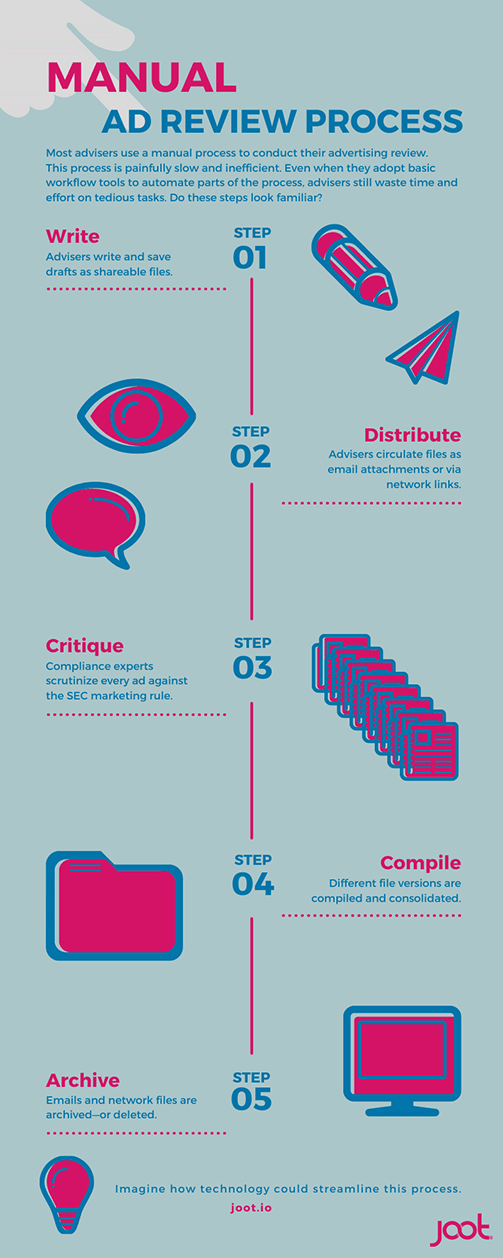
By: Bo J. Howell
The SEC New Marketing Rule and Compliance Technology: Where We Are
Conducting an advertising review is often a laborious process. Why? Most advisers have become accustomed to trudging through these manual steps to ensure compliance.
Some advisers have adapted this process to simplify their advertising review. Basic workflow tools, like network chat and file storage, automate parts of the process by facilitating content collaboration, version control, and ad approval. Although these tools eliminate the need for hardcopies and long email chains, they still require compliance experts to review multimedia ad content against the new marketing rule. And while the new rule acknowledges the necessity for advisers to produce more and better marketing materials, advisers are finding that increased content pushes underfunded and understaffed compliance departments to the limit. What’s more, advisers are liable for what they publish—and for what their clients say.
As a result, many of today’s advertising technology, or ad tech, systems fail to address three underlying challenges of advertising review:
- Expertise. Advisers need to rely on compliance experts who understand the new marketing rule.
- Effort. These experts need to review every ad to make sure it complies with the new rule.
- Time. Reviewing every ad for compliance takes time—and money.
There’s got to be a better way, right?
The New Marketing Rule and Compliance Technology: Where We’re Going
To take advantage of the expanded advertising opportunities made possible by the new marketing rule, advisers need to change how they produce, review, and publish content. Other industries have already capitalized on a range of sales-effective advertising methods, such as video marketing, testimonials, and reviews. The new rule now allows advisers to use these methods too.
But the new rule has revealed there’s still a significant gap between what advisers can do and how social media currently works. Rule requirements are misaligned with the design, function, and goal of social media. Today’s social media platforms are intended to accelerate and expand marketing reach—not necessarily ensure compliance or meet regulatory disclosure obligations. Investment advisory firms are left to identify and incorporate compliance requirements in each post, an unmanageable burden for many small firms with limited marketing and compliance resources.
Technology can bridge the gap between the new marketing rule and its implementation. Coupled with compliance technology tools—like an automated compliance calendar, content library, and document manager—artificial intelligence (AI) can help advisers align their advertising strategy with the new rule. Here are some potential uses of AI with compliance technology.
For all the benefits it offers, AI requires human intervention and oversight to ensure it’s used effectively and ethically. To meet their fiduciary duty, advisers must take these actions:
-
- Have a basic understanding of the machine learning models behind the technology
- Ensure that all advertising content meets rule requirements
- Tell consumers when and why they’re collecting data
- Document social media posts appropriately across multiple platforms
- Develop a strategy pertaining to likes, comments, and replies
Similarly, the financial services industry needs to overcome three major challenges:
- Complexity. Most AI is not general but narrow, limited by its ability to solve simpler problems versus more complex, context-aware problems.
- Creativity. Common sense is still missing from AI, creating an obstacle for the creative forms and witty language of advertising.
- Trust. An industry built on human interaction may not readily trust AI with compliance tasks.
This post was also published on Joot.io.
Bo Howell primarily practices in the area of securities law, with an emphasis on investment management law. He also practices in the areas of corporate law and entity formation, and general business law. Bo has extensive experience in all aspects of investment management law, including fund formation, mergers and acquisitions, corporate governance, and compliance. Bo is also a co-founder and CEO of Joot, a compliance and consulting services company helping Chief Compliance Officers at registered investment advisers, broker-dealers, and funds. He can be contacted at 513-629-9482 or at bjhowell@strausstroy.com.



